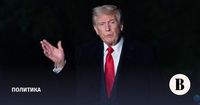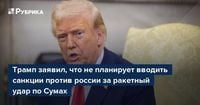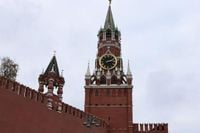The Kremlin reacted on April 14, 2025, to the extension of anti-Russian sanctions by U.S. President Donald Trump, asserting that the decision was expected and automatic. Dmitry Peskov, the press secretary for the President of the Russian Federation, stated, "It is unlikely that another decision would be expected, especially since these are quite automatic actions." This response came after Trump extended the sanctions initially imposed by his predecessor, Joe Biden, in April 2021.
Trump justified his decision by claiming that the actions of the Russian government continue to pose an unusual and extraordinary threat to the national security, foreign policy, and economy of the United States. The sanctions are rooted in Biden's Executive Order No. 14024, which declares a national emergency concerning threats to U.S. national security. This order enables sanctions against Russian individuals and entities involved in election interference, cybercrimes, transnational corruption, and the persecution of journalists and dissidents.
Since its introduction, the decree has been expanded multiple times, now encompassing not only sanctions against individuals and organizations but also the blocking of Russian assets and secondary restrictions on foreign financial institutions that engage with Russia's military-industrial complex.
In a related development, Trump stated he does not plan to impose additional sanctions against Russia following a missile strike on Sumy by Russian forces on April 13, which resulted in the deaths of 35 people. This remark was made during a meeting with El Salvador's President Nayib Bukele, where reporters inquired about potential further sanctions. Trump emphasized that he had already imposed sanctions related to the Nord Stream 2 pipeline, which he described as a major Russian project that he successfully halted.
Reflecting on the missile attack, Trump called it a "terrible mistake," but reiterated that he has already taken significant action against Russia. His administration had recently enacted new sanctions targeting four individuals, three entities, and one cargo ship, further tightening the economic pressure on Moscow.
On February 24, coinciding with the anniversary of Russia's full-scale invasion of Ukraine, the European Union implemented its 16th sanctions package against Russia. This new package includes a ban on importing primary aluminum from Russia, expands the blacklist against Russian shadow fleet tankers, and excludes 13 Russian banks from the SWIFT electronic payment system.
Moreover, on February 27, 2025, Trump also extended sanctions related to the territorial integrity of Ukraine, which were first introduced by former President Barack Obama in 2014 through Executive Order 13660. This order targets individuals and organizations deemed responsible for undermining Ukraine's sovereignty.
Despite the renewed sanctions and ongoing tensions, Peskov indicated that there are no heightened expectations for a shift in U.S.-Russia relations. He noted, "We are probably at the beginning of our journey to normalize relations, to build [relations] practically anew. Therefore, we had no exaggerated expectations in this regard." Official contacts at the highest levels between Moscow and Washington have resumed since Trump took office again, including a phone conversation with Russian President Vladimir Putin in February 2025.
Following this conversation, delegations from both nations met several times in Saudi Arabia and Turkey, where discussions revolved around resetting relations and addressing the ongoing Russian-Ukrainian conflict. However, reports from Axios on April 11 suggested that Trump is disappointed with the lack of significant progress in negotiations, and if no agreement is reached by the end of the month, he may consider imposing additional sanctions against Russia.
The geopolitical landscape remains complex as both nations navigate a fraught relationship marked by sanctions and military actions. While Trump has taken steps to address the perceived threats from Russia, the Kremlin's response indicates a readiness for continued tensions.






